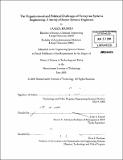The organizational and political challenges of Enterprise Systems Engineering : a survey of senior systems engineers
Author(s)
Rashid, Faaiza
DownloadFull printable version (11.71Mb)
Alternative title
Organizational and political challenges of ESE : a survey of senior systems engineers
Other Contributors
Massachusetts Institute of Technology. Technology and Policy Program.
Advisor
John S. Carroll.
Terms of use
Metadata
Show full item recordAbstract
Systems engineering efforts are becoming increasingly complex, novel and interdependent, making traditional systems engineering approaches only partially applicable to such efforts. Consequently, a new discipline is emerging called Enterprise Systems Engineering (ESE), where enterprise is defined as a collection of interdependent systems, including people, processes, and technology that can refer to a supply chain, a corporation, a program, or other large-scale, complex adaptive entities. Enterprises are comprised of multiple powerful stakeholders (suppliers, sponsors, customers, users) with competing interests who have to coordinate and collaborate. Lacking a stable, single control authority, enterprises often have contestable decision-making and governance domains. Therefore, ESE projects frequently evolve in somewhat unpredictable ways due, in part, to their multiple end users and multiple stakeholder organizations. These drivers of unpredictability define the 'social contexts' of ESE, and include organizational and political challenges that are usually very difficult to overcome. Currently, practitioners are concerned because there is neither a theory nor a set of best practices to better manage the social contexts of ESE. Fundamental questions remain about the nature and impact of social context challenges. To address these questions, a survey questionnaire was fielded to senior systems engineers, with depth and breadth of experience leading enterprise scale initiatives. The results show that social context challenges significantly impact ESE success with a large majority of the respondents assessing these challenges to be equally or more important than technical challenges in ESE. The critical social context challenges are building relationships, achieving consensus, communicating and listening, managing uncertainty and change, and dealing with organizational and process factors. Effectively managing these challenges requires individual skills, a certain mindset, and an enabling environment. The results of this study can help focus future research, provide a basis for development programs for ESE, inform systems engineering curricula in academic institutes, and help build organizational mechanisms conducive to effective management of social context challenges in ESE.
Description
Thesis (S.M. in Technology and Policy)--Massachusetts Institute of Technology, Engineering Systems Division, 2008. Cataloged from PDF version of thesis. Includes bibliographical references (p. 89-92).
Date issued
2008Department
Massachusetts Institute of Technology. Engineering Systems DivisionPublisher
Massachusetts Institute of Technology
Keywords
Engineering Systems Division., Technology and Policy Program.